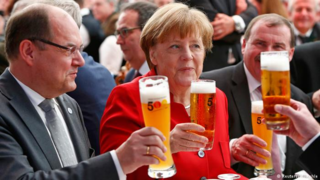In a 2007 column titled "
The Deniers' Club" (a play on the best-selling novel
The Liars' Club by
recovering writer Mary Karr), highly respected New York magazine and
public radio journalist Kurt Andersen attributes George W. Bush's
dishonest representations about, and incompetent handling of, the Iraq
War to Bush's having quit drinking without joining Alcoholics
Anonymous. Thus the "denier" appellation.
I mean, who ceases drinking without AA? (Answer:
A large majority of alcoholic Americans no longer drink alcoholically without going to AA, and most of them don't abstain.)
But
President Donald Trump,
whom I doubt that Andersen is more inclined to approve of than Bush,
might cause us to re-evaluate the basis of Andersen's judgment that
Bush's flaws are due to his quitting drinking on his own, without the
benefits of AA membership.
President Trump's Abstinence
President Donald Trump isn't one to go along with the crowd. While the
six other world leaders at the G7 summit — from Britain, Canada, France,
Germany, Italy, and Japan — walked together to take a group photo at a
piazza on a Sicilian hilltop, President Trump rode a golf cart.
"Piazza," "Sicily" — makes you think of wine, doesn't it? Not Donald
Trump. The president has famously never consumed a drop of alcohol in
his life. Trump has claimed that he abstains because his brother Fred
died from alcoholism. But
Trump (who was nine years younger than Fred) would have become aware of
his brother's drinking problem only in his own 20s — perhaps late 20s,
since his brother's failures at his father's company, where Donald
excelled, only became apparent in the years before Fred's death at 43.
How many of the other G7 leaders — or for that matter, how many of
the other leaders of the 28 NATO nations — abstained during official
dinners? Do you think that Emmanuel Macron refused wine — or the heads
of Luxembourg, Belgium, Switzerland, Italy, Spain, and Greece, along
with leaders of other European nations?
While we're at it, do you think many of the Chinese leaders didn't toast during their elaborate state dinners?
I'll speculate there's a good chance that not a single European or Chinese
leader
abstains. (Surely some of them have had a close relative with a
drinking problem.) In the case of German Chancellor Angela Merkel, we
don't have to hypothesize. News photos show her toasting a long table at
which everyone is hoisting a beer stein.
The German chancellor — a woman — drinks beer publicly!
Actually,
so did Hillary Clinton. And Bill Clinton, despite having an
alcoholic
stepfather, also drank. Meanwhile, Barack (whose own father developed
serious drinking problems) and Michelle Obama regularly drank — the
movie about their first date,
Southside With You, shows them having a beer together after seeing the movie,
Do the Right Thing. And
when the Obamas went out for a special evening, they each had a couple
of fancy cocktails with dinner before seeing a Broadway show.
However, as noted by Andersen, the last Republican President prior to
Trump, George W. Bush, also didn't drink — in his case, Bush decided to
abstain because of issues he had had with drinking.
The American Abstinence Fixation
Abstinence from alcohol is common
in the U.S. — more so than in any other Western nation. When abstinence
is defined as drinking less frequently than once a month, almost half
of Americans abstain.
If this figure seems high to those of us in New York, about one-third
of people in Northeast states (which have large ethnic populations)
abstain compared with around two-thirds in Southern states. There is a
positive correlation
between drinking and socio-economic status, so that better-off people
are more likely to drink, but to drink moderately, in the U.S.
When looking at America's abstinence fixation, consider in how many
other Western (European and English-speaking) countries drinking is
legally restricted to those 21 years of age and older. The answer:
none. Even in non-Mediterranean countries, the typical drinking age is
18. In our northern neighbor, Canada, the country most like us, the
drinking age varies from province to province, but in none of them is it
21. That goes for all of Latin America, too.
What the hell is the matter with the rest of the world?
We may wonder whether French-speaking Quebec's drinking age is at the
low or the high end of the spectrum for Canadian provinces. If you
guessed "low" (meaning 18), you're right. In Southern European
countries, on the other hand — France, Italy, Spain, Greece, Portugal —
the general rule is that 16-year-olds can purchase and drink beer and
wine. And in cafes and restaurants, the rule of thumb is that children
of any age can sip wine with their families.
So Trump's abstinence from alcohol is not unusual for Americans, even as
it sets him — and us — apart from the rest of the economically advanced
countries on the planet.
Kurt Andersen's Deniers' Club and Trump
However dubious is Andersen's argument that abstaining without going to
AA explains George W. Bush's botched international forays, his
hypothesis makes no sense whatsoever in Trump's case, since Trump never
had a drinking problem. Instead, adding Trump to the Bush mix suggests
an alternative hypothesis — you can't trust the judgment of anyone who
doesn't drink. After all, if they can't control themselves, how can we
count on them to navigate our country's fortunes?
In the meantime, we might also consider our current President's
health
in relationship to his abstinence, since he is obese as well and
eschews exercise. That is, older Americans like Trump who are lifetime
abstainers have a
significantly higher death rate than drinkers:
"The rates of death from all cardiovascular diseases were 30 to 40
percent lower among men and women reporting at least one drink daily
than among nondrinkers, with little relation to the level of
consumption." (Shhhh!
You're not allowed to know that!)
And, so, our best conclusion is not Anderson's idea that quitting
drinking without AA's help causes dangerous and self-deceptive
behavior. It's simply abstinence that causes these dangerous personal
traits.
Afterword:
Submitted by Gregory Bogosian:
Instead, adding Trump to the Bush mix suggests an
alternative hypothesis — you can't trust the judgment of anyone who
doesn't drink. After all, if they can't control themselves, how can we
count on them to navigate our country's fortunes?
So Buzz Aldrin, Muhammed Ali, Isaac Asimov, Warren Buffet, Joe Biden — none of them can be trusted.
Stanton responds:
Gregory, The next generation of Asimovs is quite
interesting. Eric Asimov, Isaac's nephew, is wine columnist for the NY
Times. Since Isaac abstained from alcohol, it's ironic, don't you think?
I wonder what family dynamic brought that about.
David Asimov, Isaac's son
is a sad story: could it have anything to do with Isaac's fears about
self-control?
For all of his 47 years, David Asimov has lived
deep in the gargantuan shadow of his late father, Isaac Asimov. . . Last
week, the younger Asimov achieved his own unwanted notoriety when Santa
Rosa police arrested him after searching his home and discovering what
investigators say may be the biggest child
pornography collection in Sonoma County history.
Could wine have helped that family dynamic?
I had a "bestseller" for Pacific Standard digital magazine entitled “
The Truth We Won’t Admit: Drinking Is Healthy." This is its final paragraph:
Human beings have grown up alongside alcohol:
Beverage alcohol has been found at the site of every early center of
civilization. The more alcohol a society consumes, the fewer
alcohol-related problems and alcohol-related deaths (including
cirrhosis) it has, since these societies, such as those in Southern
Europe, integrate drinking with
social life.
And alcohol conveys health benefits. If you cannot drink (or believe
that you cannot), you probably increase your likelihood of early death.
If so, I am truly sorry for you.
Gregory, Isn't Armenia a wine culture? And it goes without saying, I don't want you to drink!
__________________________
Mary is concerned that I ignored women's situations:
The mortality from breast cancer was 30 percent
higher among women reporting at least one drink daily than among
nondrinkers (relative risk, 1.3; 95 percent
confidence interval, 1.1 to 1.6).
I commend Mary for clicking into the
original study,
which appeared in the New England Journal of Medicine, and comprises
the largest prospective study of life and death among drinkers (a
half-million men and women over the age of 50). Anti-alcohol people
often claim these studies are funded by the alcohol industry (it was
funded by the American Heart Association).
And, as I said, the study found that women who drank had a
significantly lower death rate than those who abstained, as I reminded
Mary:
Women who drank lived longer than women who didn't
drink. This occurred since "death from all cardiovascular diseases were
30 to 40 percent lower among men and women reporting at least one drink
daily drink," and 10 times as many women die of heart disease as breast
cancer. If you have breast cancer in your family, that does change the
equation in ways that haven't been calculated — otherwise, the odds
favor your living longer if you drink.
I then added:
Mary, don't take this the wrong way — I don't want you to drink!
To which Mary replied:
Teetotaler.
No worries, I am a non-drinker. Never liked or
acquired the taste of alcohol. I am one of those who will participate in
the toast, raising the glass, but not imbibing (which is perfectly
acceptable social behavior during a toast) of that awful sherry.
Unfortunately, I had to inform Mary:
You know, don't you, that when one person doesn't
drink during a toast that the exact opposite of the toasted outcome
occurs: the
marriage
isn't long and happy, the graduate doesn't succeed in life, and the
baby — well, I won't speculate. (By the way, Mary, you certainly must
avoid a Jewish bris, where they put wine on the baby's lips!)



